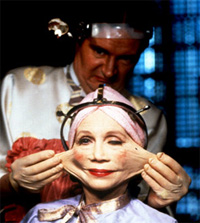Are Ads for “Fake” Complaint Sites False Advertising?
 The Consumer Law & Policy Blog describes a case of arguably false advertising, in which a “face lift” firm paid for keywords relevant to people complaining about their trademarked service, but connected them to a site singing its praises. Their apparent intent was to draw those seeking information for detractors to a forum which only promotes the product without acknowledging complaints at all.
The Consumer Law & Policy Blog describes a case of arguably false advertising, in which a “face lift” firm paid for keywords relevant to people complaining about their trademarked service, but connected them to a site singing its praises. Their apparent intent was to draw those seeking information for detractors to a forum which only promotes the product without acknowledging complaints at all.
The ad’s format is “<Trademarkname> Complaints….a Stanford Doctor speaks out”. As I write this, simply enter “Lifestylelifts Complaints” in Google to see the ad. It establishes the expectation of a complaint site without any exact promise of the forum’s scope or independence. However, reasonable readers would expect to see complaints about the product. And that’s not what they get.
The deception, however, is momentary and ends at the bottom of the landing page that the ad leads to; the trademark holder identifies that it operates the site. So, imaginably, those who want to find true complaints could use their back button and return to the search page for other choices.
The Consumer Law & Policy Blog asks:
Are there viable theories for pursuing the use of deceptive keyword ads by the trademark holders themselves? A number of theories come to mind. Consumers might bring a deceptive marketing complaint to the FTC, or might sue under such state consumer laws as section 17500 of the California Business and Professions Code. Or, perhaps a competitor of Lifestyle Lift might contend that the Google ads are deceptive promotions and file suit under section 43(a)(2) of the Lanham Act.
There might be, but any claim of false advertising would be nuanced. Though a false impression is created, it is done without outright false statements. To the extent that such ads are confined to a single site, and that they do not crowd out other paid or organic results, I’d prefer that such practices would be left to the judgment of consumers rather than courts.
As important as being free from even momentary confusion may be, consumers may have a greater affirmative right to have have efficient access to communications. This would include both access to complaint sites and to paid postings by mark holders attempting to answer or diminish such concerns, as long as such efforts are generally non-deceptive and not engineered to prevent access to legitimate complaints.
Momentary confusion after reading or clicking on an ad is a low threshold for claiming deception. In both cases of trademark and consumer rights, I would hope the legal system’s focus would be reserved for those making efforts at concerted deception, rather than statements that only have potential to create moments of confusion.
Skepticism and a tolerable level of confusion come with any robust marketplace. Completely removing the likelihood of confusion would take a considerable portion of consumer communication along with it. This seems like a job better done in the court of public opinion.

 The future of digital experiences will be built by strategists who grasp the full array of emerging business, social, and technical models. Specialties in user experience, branding, application design, and data science are laying the foundation for richer user experiences and business models breakthrough products and revenue based marketing.
The future of digital experiences will be built by strategists who grasp the full array of emerging business, social, and technical models. Specialties in user experience, branding, application design, and data science are laying the foundation for richer user experiences and business models breakthrough products and revenue based marketing.
Comments are closed.